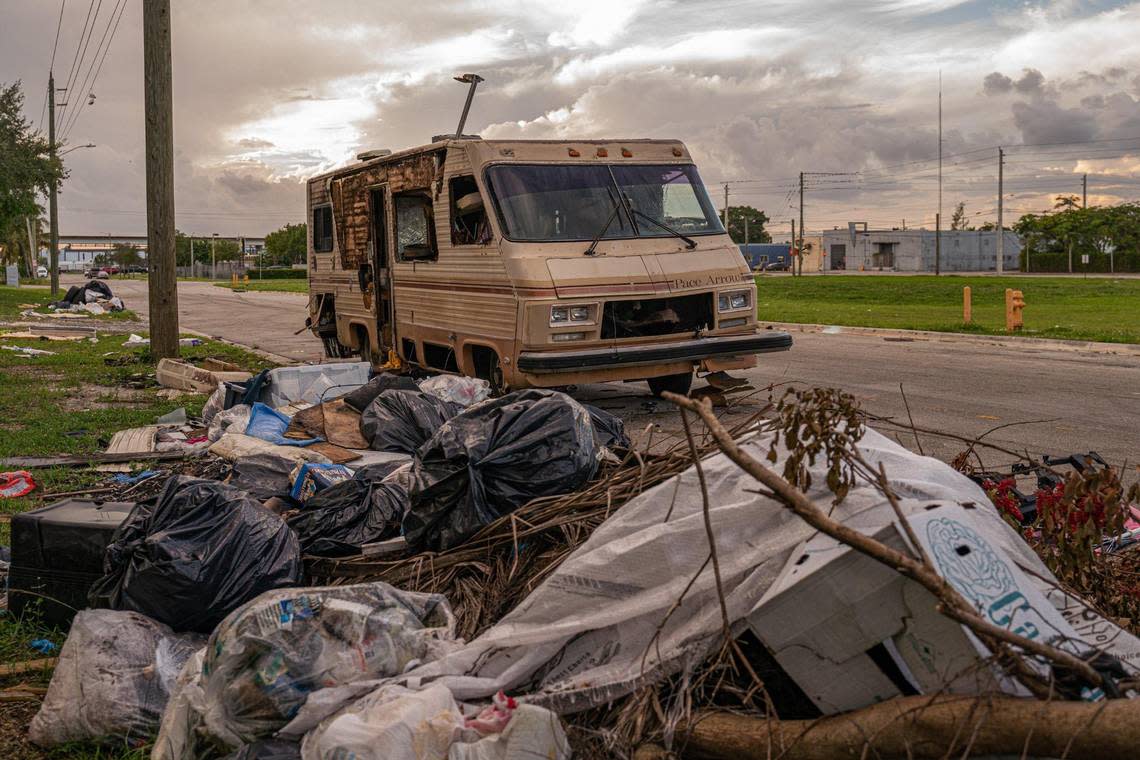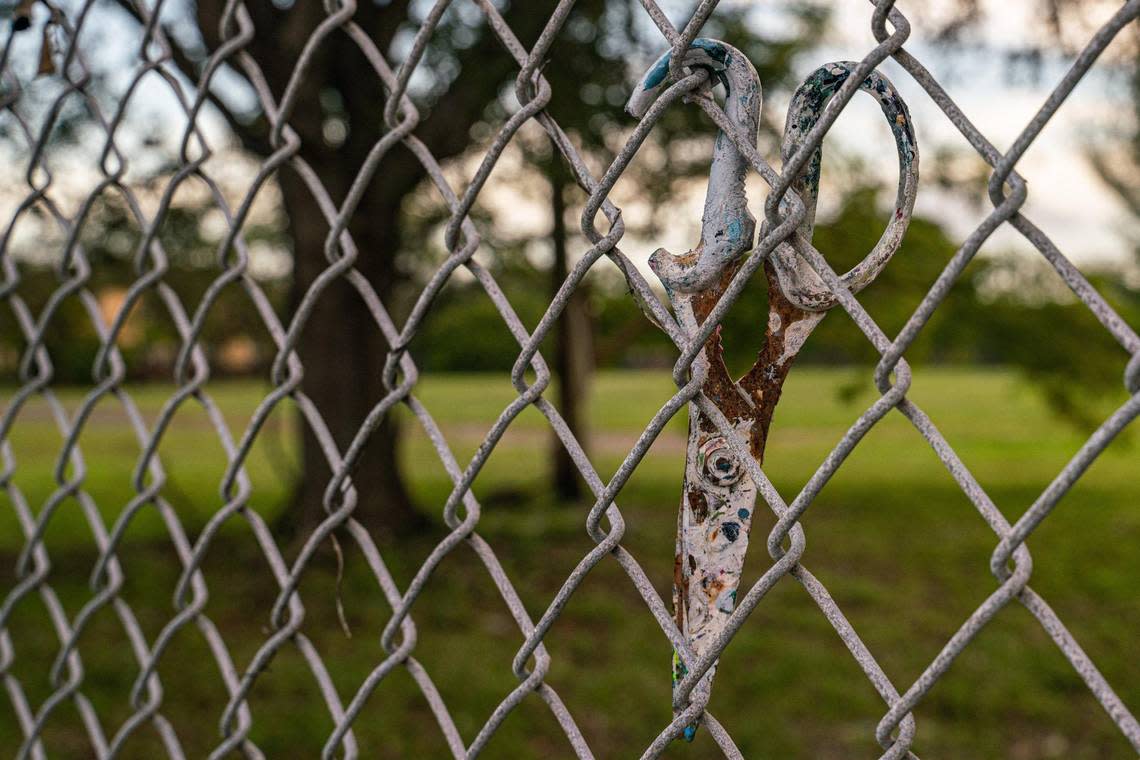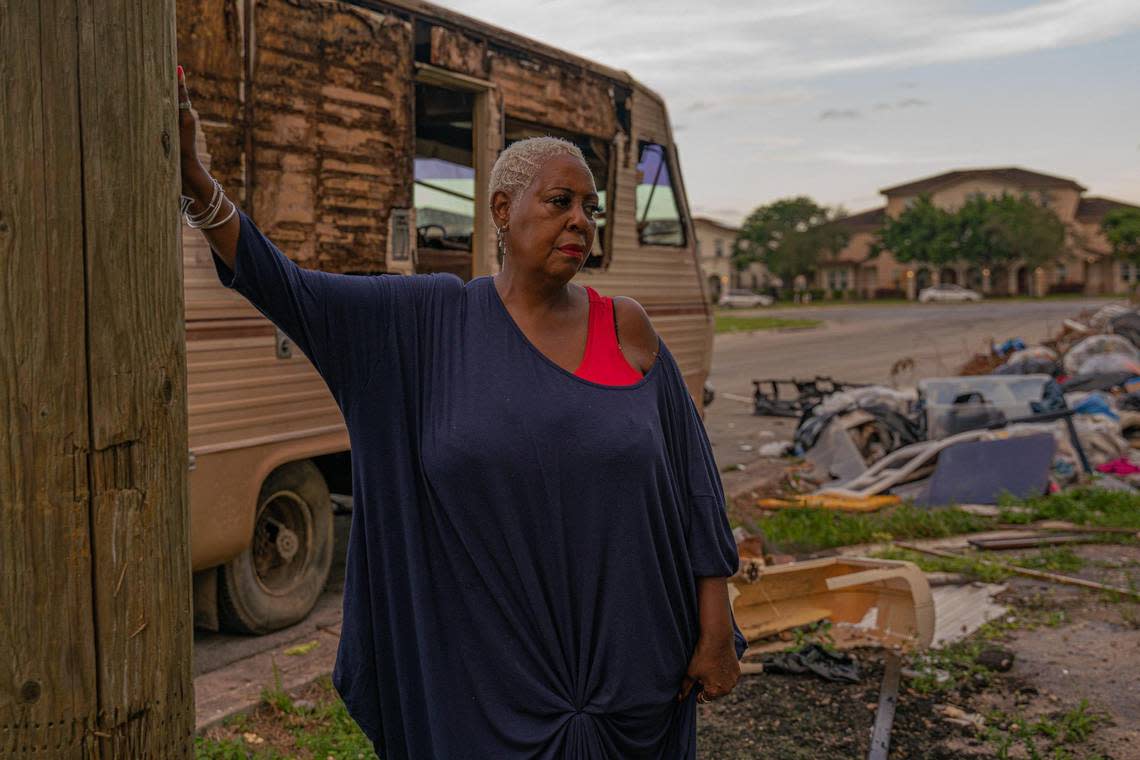Neglected for decades, Miami-Dade’s Poinciana site now in a heated development contest
From her front yard, Sonya Brown-Wilson can see seven acres of grassy land owned by Miami-Dade County that could be part of Liberty City’s next big development site but currently serves as an illegal dumping ground for refuse large and small, including a ransacked Pace Arrow RV with no doors, missing windows and an exposed, rotting frame.
“I’m proud of my place,” the retired teacher said from one of the two lawn chairs she keeps outside for chatting with visitors at the North Park housing complex near where Northwest 22nd Avenue meets 79th Street. “But when I look across the street, I get ticked off.”
The illegal dumping site is part of a patchwork of 16 county-owned parcels in a five-block area south of Northwest 79th Street, between Northwest 27th and 23rd avenues. While separated by other private and county lots, the Poinciana site totals roughly 24 acres in all.
Vacant for decades, the would-be development site is called the Poinciana Industrial Park or Poinciana Park in county documents. The idle land was seen as key to reviving Liberty City after riots in 1980, which destroyed retail and commercial buildings that anchored much of the neighborhood economy.

What was then Dade County funded a development push in the late 1980s that tried to revive the former commercial district with a large-scale bakery and food distributor. That effort fizzled, as did Miami-Dade’s lining up $60 million in tax-exempt bonds in 2007 to bring a pharmaceutical plant there, a venture that ended in fraud charges against a developer.
In 2012, the county commissioner representing the area at the time, Jean Monestime, unveiled a Poinciana Park development strategy based on a committee’s study of the area.
Six years later, then-Gov. Rick Scott signed a Florida budget in 2018 that included $2 million to boost economic development at Poinciana, but the money was never spent.
“Nothing has happened,” said Roy Hardemon, the former Democratic Florida representative responsible for the 2018 appropriation. “Someone is playing games with that community.”
Back in the mix for a project
Now the 24 acres of county-owned parcels are targets of competing proposals from development groups promising to spend upwards of $135 million transforming the idle land into housing complexes and commercial centers.

Both teams have backing by local real estate moguls. In the one camp, there’s Moishe Mana, owner of extensive commercial holdings in Miami’s Wynwood neighborhood. In the other camp, there’s Michael Swerdlow, the developer behind the Dolphin Mall in Sweetwater and who last year broke ground on the mixed-use Block 55 project off Sixth Street in Miami’s Overtown neighborhood.
The push to gain control of the Poinciana land has sparked political friction.
In September, U.S. Rep. Frederica Wilson, a Democrat whose district includes the Poinciana site, released a letter protesting a planned vote before the County Commission on the Swerdlow proposal and accusing Monestime of “deliberate inaction” on considering expansion of a state health clinic onto some of the county property sought by developers. The commission vote never happened, despite county notices in the neighborhood announcing a potential deal, and Mayor Daniella Levine Cava said her administration is reviewing both proposals.
In August, the development group that includes Mana and the nonprofit formed to promote economic development on the 79th Street corridor released issued a public letter criticizing the Levine Cava administration for stalling on the partnership’s job-creating proposal while seeming to favor Swerdlow’s offer.
“Enough is enough,” read the letter from the 79th Street Corridor Initiative, Mana’s nonprofit partner. “We cannot accept silence, a backroom deal with opportunistic parties, or no for an answer.” Swerdlow hasn’t responded publicly but said in an interview his proposal is obviously superior.
“I’m paying more,” Swerdlow said, “and they know I’ll build it.”
Swerdlow has large real estate ventures in his list of completed projects, including Las Olas Waterfront in Fort Lauderdale and the Dolphin Commerce Center next to the Dolphin Mall. He struck a deal with North Miami in 2002 to develop the former landfill known as Biscayne Landing, then sold his stake as former partners let the project languish during the housing crash later that decade. Swerdlow was back with a proposed revival of Biscayne Landing in 2011 as the market recovered, but sold his stake again in 2015.

Community involvement at issue
One flash point in the competition is whether the Swerdlow team can match the local ties to Liberty City that the rival proposal brings to a project aimed at reviving the economy in one of the Miami area’s historically Black neighborhoods. Until earlier this month, the 79th Street Corridor group had a $75,000-a-year contract with the county’s 79th Street Community Redevelopment Agency to serve as the governmental entity’s “economic development coordinator,” and has been in talks with the county for years to bring a commercial operation to the site.
The nonprofit 79th Street Initiative is led by Black executives, including director Ron Butler and Teri Williams, president of OneUnited Bank, and has a partnership with a development entity affiliated with the Urban League of Greater Miami.
“This is community led, and has been birthed by the community from the outset,” said Oliver Gross, a former chair of the 79th Street CRA and president of New Urban Development, the development entity tied to the Urban League. “It’s not just a transaction. It’s an effort in transformation.”
Swerdlow’s partnership includes Alben Duffie, a Black former administrator in the county’s Office of Minority Business Development in the 1980s and ‘90s. After leaving the county, he went on to work as a lobbyist and a development executive in private deals with local governments, including an office building at the Martin Luther King Jr. Metrorail station, and Swerdlow’s Block 55 project.
He also was a board member of the county-backed charity MDHA Development Corp. behind stalled affordable-housing projects detailed in the Miami Herald’s 2006 “House of Lies” series. Duffie has gone on to participate in public deals in the two decades that followed the series. He said no government review of the county’s housing problems found issues with his role at MDHA. “I didn’t do anything wrong,” Duffie said.
The nonprofit 79th Street organization’s application for a federal grant in 2021 positions the project as a way to help a neighborhood set on a disadvantaged economic track by decades of racism and race-related trends.
“Noxious uses, including landfills, junk yards, borrow pits, railyard maintenance facilities, a pesticide packing facility, and a chemical plant were all located here away from residents with lighter skin, more money, and the ability to influence,” the application reads. It said the local economy never recovered from the McDuffie riots, as businesses opted not to return. “Media coverage of the target area further poisoned the image of the community and created tremendous public fear.”
Brown-Wilson said jobs are definitely needed in her neighborhood, along with a new community center for seniors she’d like to see on the Poinciana site. She lives in the county-owned North Park housing community, and said the vacant land produces nuisances for the neighborhood.
There’s the dumping of trash along the dead-end lane that’s visible from North Park. She and other neighbors also said the paved straightaway is a popular spot for high-speed shenanigans, as evidenced by the black circles formed by tire tracks on the asphalt.
“The motorcycles are there at 2 and 3 in the morning,” said Bernadine Dent, another North Park resident. “There’s so much illegal stuff going over there, it’s a shame.”
In the spring, Swerdlow entity SG Allapattah was in talks with Miami-Dade about using a portion of the Poinciana site for storing city garbage trucks as part of another development deal he was hoping to close for a depot owned by Miami in the Allapattah neighborhood, according to a summary provided by the county’s housing director during a discussion recorded under Florida’s open-meetings law.
“They have a letter of intent from Costco to put a Costco on the [Allapattah] site,” Public Housing and Community Development Director Michael Liu said of the Swerdlow group at an April 22 meeting with Monestime and the county commissioner whose district includes the Allapattah site, Keon Hardemon. “However, the challenge for the city is they have to find an alternative site for their sanitation trucks. The SG Group is proposing the city be able to use the parcels at Poinciana for that purpose.”
A Liu spokesperson said the sanitation-truck possibility was dropped by the time Swerdlow submitted his first written Poinciana proposal in June. “Sanitation trucks have not been in play from the first formal proposal to now,” spokesperson Ignacio Petit-Ortiz said.
Here’s a look at what the two development groups have proposed for the vacant county land:
Commercial operations at proposed Poinciana development
▪ The 79th Street group would build about 500,000 square feet of commercial space, with an estimate of more than 200 permanent jobs on site, according to the group’s most recent proposal, dated Aug. 4. Proposed operations include a 200,000-square-foot document-storage facility and headquarters operated by GRM, a Mana entity, as well as about 250,000 square feet of food storage facilities and a 25,000-square-foot warehouse complex shielded from some import-fee requirements with what’s known as a Foreign Trade Zone.
▪ An Aug. 19 proposal submitted by Swerdlow’s partnership does not detail the kind of specific commercial operations proposed by their competitor. Instead, the proposal says the developer will “use its best efforts” to bring commercial uses to two of the six Poinciana parcels. The commercial element was a change from the plan the Swerdlow group submitted in June that only focused on residential construction, with a proposed 1,000 units of affordable housing.
Housing plans for proposed Poinciana development
▪ When the Swerdlow group added commercial development to its proposal, it noted that may mean Miami-Dade would see fewer housing units on the Poinciana sites. While the June proposal included 1,018 housing units, the one filed in August states the development group “still commits to at least 600 units of affordable or workforce housing being built on the site.”
▪ The 79th Street group initially proposed 92 workforce-housing units build by New Urban Development, the development entity affiliated with the Urban League of Greater Miami, a nonprofit focused on helping Black children in Liberty City. Butler, director of the 79th Street group, said that offer will increase in the final proposal to around 300 housing units.
Community benefits offered in competition for Poinciana site
▪ Swerdlow proposed several cash outlays as community benefits, including at least $280,000 in tuition for 70 nearby residents to attend Miami Dade College’s property-management program, plus an additional $300,000 for general scholarships; $350,000 for sports activities at the nearby Gwen Cherry county park; and an 8,000-square-foot community center. Swerdlow also said 10% of the commercial space would be available at below-market rents for four years for small businesses, and guarantee 130 jobs paying at least the county’s living wage (currently $18.73 an hour). In the updated proposal, Swerdlow said one of the commercial parcels would be dedicated to a 10,000-square-foot facility dedicated to visual arts, with space for galleries and studios.
▪ The 79th Street group proposal also includes requirements for jobs on the site paying at least living wage, and requirements that nearby residents get the first shot at employment openings there. The group also proposed a 3,000-square-foot community center.
Financial strategies of the two Poinciana proposals
▪ The 79th Street group wants to develop the county land under an 85-year lease, with no rent due until the eighth year, according to a draft lease submitted to the county. After that, rent ranges from about $240,000 a year to nearly $1 million at the end of the term. A county appraisal of the Poinciana site from February estimates commercial space would rent for $1.50 to $3.40 per square foot, depending on the location, suggesting a revenue stream for the project of at least $750,000 a year if the 79th Street group builds its proposed 500,000 square feet.
▪ The Swerdlow group wants to purchase the land from Miami-Dade at fair market value. At the April meeting, Liu said the land was appraised at roughly $30 million.

What’s next for Poinciana?
Both groups have been in touch with Miami-Dade about the Poinciana land in the last several years, but the competition heated up in 2022.
In its August proposal, the 79th Street group included a planned expansion for the food distributor Leasa, which already operates on land next to a Poinciana parcel. The next month, Leasa President Andrew Yap sent a letter to county officials saying the company supported Swerdlow’s proposal.
In early September, Butler and other 79th Street leaders met with Levine Cava and staff to pitch their plan. Two weeks later, Butler wrote the mayor complaining that Swerdlow seemed to have insider access with the administration.
“Unfortunately, hours after our meeting, two of our board members who attended received caustic and demeaning telephone calls from Michael Swerdlow, who indicated that he was fully aware of everything that was discussed at our meeting,” Butler wrote.
In an interview, Swerdlow confirmed making heated calls to a pair of 79th Street board members: Gross and Norman Taylor, a retired economic-development director in Broward County. “They went to the mayor to tell her I don’t care about Black people. And it’s not true,” Swerdlow said.
Gross declined to comment. Taylor confirmed the call, and said Swerdlow misrepresented what was discussed at the meeting. Taylor also said he pointed out the 79th Street group once approached him about getting involved in the Poinciana effort.
“I reminded him you were the first person we called, and you were a no-go...You said everything bad about Poinciana,” Taylor said, describing his conversation with Swerdlow. “Let’s just say it was not cordial. It did not end well.”
The competing proposals put pressure on Monestime’s replacement in District 2, Commissioner Marleine Bastien, to advocate for the next steps. Both developers submitted their plans as unsolicited proposals outside of the county’s normal bidding procedures. Bastien declined to comment on the Poinciana proposals.
Levine Cava, a Bastien ally, could recommend the commission approve one proposal without considering the other, choose between the two, or launch a bidding competition for the land that would force both teams to submit fresh offers. In an interview earlier this year, Levine Cava said her administration is reviewing the proposals before recommending action. “We’re doing our due diligence,” she said.
